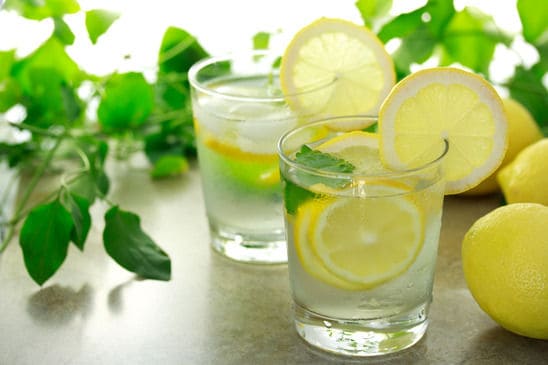
Previous
N-Acetyl Cysteine Treats Acute Liver Failure

Next
A Happy Liver Will Make Your Holidays Happier Too
Love Your Liver With Lemon Water
Discover why there are few beverages as beneficial as lemon water when it comes to actually helping guide your liver towards better health.
Because the liver is affected by everything we ingest, beating chronic liver disease requires every drink, snack or meal to be a health conscious decision. As one could imagine, such analysis can be draining to those who are not trained health or nutrition professionals. Nowhere is this decision making process more important for an ailing liver than in the beverage category. Tastier than plain water and containing several health benefits, those with chronic liver disease have every reason to make lemon water their go to hydrating medium.
Imagine a relatively inexpensive, palate-pleasing, refreshing beverage that is good for your liver. Amidst all of the warnings describing which drinks to avoid because they harm the liver, such an ideal beverage does exist. Squeezing some fresh lemon juice into a glass of purified water is all that is required to create a liver-loving liquid.
Water
The human body’s composition is 60 to 70 percent water, and health problems typically arise without enough of this basic compound. A good rule of thumb for overall healthfulness typically involves drinking plenty of water. In addition to benefiting most of our tissues, organs and systems, water specifically promotes good liver health. The hepatic value of water primarily is due to its aid in detoxification.
Water is largely responsible for the fluid content of blood. As the organ that filters the blood, its viscosity impacts the liver’s detoxification abilities. Accordingly, not drinking enough water will increase the blood’s thickness and make it harder to filter. Since the livers of those with chronic liver disease already face obstacles to efficient detoxification (like inflammation or scarring), not having enough water to keep the blood viscous magnifies this challenge.
Lemons
Fresh lemons are one of nature’s secret weapons against a variety of illnesses. The liver is a particular benefactor of this sour, yellow fruit. According to Jethro Kloss in his book Back to Eden, “Medicinally, lemons act as an antiseptic – an agent that will prevent infection or putrefaction. …They also assist in cleansing the system of impurities. The lemon is a wonderful stimulant to the liver and is also a solvent for uric acid and other poisons.”
Expanding on Kloss’ medicinal description of the lemon, the following are two reasons that those with liver concerns should consider regular lemon consumption:
- Vitamin C – Lemons contain high amounts of Vitamin C, an antioxidant that is needed to manufacture glutathione. Because glutathione is used to neutralize toxins, lemons help the liver with detoxification.
- Enzymes – According to Dr. Alexander F. Beddoe in Biological Ionization in Human Nutrition, the liver can make more enzymes out of fresh lemon juice than any other food element. Given more of the raw materials needed to function properly, the liver’s efficiency gets a boost from lemon consumption.
Lemon Research
Because of its widespread availability, the pharmaceutical industry has little to gain from lemon’s health attributes. Nonetheless, the following two studies provide some scientific evidence supporting lemons’ benefit to the liver.
- As published by Dutch researchers in a 2002 edition of the European Journal of Nutrition, lemon peels and the waste stream of the lemon peels are effective in lowering blood and liver cholesterol levels. Although performed on animal subjects, these results insinuate that lemon peel consumption could be beneficial to those with fatty liver disease.
- As published by Indian researchers in a 2005 edition of BMC Pharmacology, hesperidin (a citrus bioflavonoid found in lemons) demonstrates the ability to protect the liver from damage. After administration of CCl4 (a well known liver toxin), the authors concluded that hesperidin demonstrates a protective effect on the liver.
It doesn’t take much ingenuity to profit from the benefits of water and lemon. By simply squeezing a lemon slice and dropping it in your glass or bottle of water, you are giving your liver a clear advantage. Especially since those with chronic liver disease are limited by the beverages that could potentially cause liver harm, a daily glass of lemon water is a superb way to love your liver.
Beddoe, Alexander F., MD, Biologic Ionization as Applied to Human Nutrition, Whitman Publications; 6th edition, Warsaw, IN, 2002; 194.
Kloss, Jethro, Back to Eden, Lotus Press, Twin Lakes, WI, 1999; 563.
http://link.springer.com/article/10.1186/1471-2210-5-2, Hesperidin, a citrus bioflavonoid, decreases the oxidative stress produced by carbon tetrachloride in rat liver and kidney, Naveen Tirkey, et al, Retrieved October 10, 2010, BMC Pharmacology, January 2005.
http://www.ehow.com/how_4869855_promote-good-liver-health.html, How To Promote Good Liver Health, Dana George, Retrieved October 10, 2010, eHow, Inc., 2010.
http://www.ehow.com/way_5148158_lemon-water-liver-detox.html, Lemon Water for Liver Detox, Nicholas Ramos, Retrieved October 9, 2010, eHow, Inc., 2010.
http://www.herbs2000.com/herbs/herbs_lemon.htm, Lemon, Retrieved October 9, 2010, herbs2000.com, 2010.
http://www.liversupport.com/wordpress/2009/12/how-much-water-does-your-liver-need/, How Much Water Does Your Liver Need?, Nicole Cutler, L.Ac., Natural Wellness, 2010.
http://www.ncbi.nlm.nih.gov/pubmed/11990004, The hypocholesterolemic effect of lemon peels, lemon pectin, and the waste stream material of lemon peels in hybrid F1B hamsters, Terpstra AH, et al, Retrieved October 9, 2010, European Journal of Nutrition, February 2002.
http://www.quantumbalancing.com/news/lemon%20water.htm, The Amazing Health Benefits of Drinking Lemon Water, Ann Heustad, RN, Retrieved October 9, 2010, EMR Labs, LLC, 2010.










